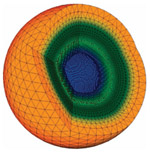Department of Physics and Astronomy: Publications and Other Research

Robert Streubel Papers
Document Type
Article
Date of this Version
2-1-2021
Citation
Published in Advanced Materials 2021, 33, 2004830
DOI: 10.1002/adma.202004830
Abstract
Topological solitary fields, such as magnetic and polar skyrmions, are envisioned to revolutionize microelectronics. These configurations have been stabilized in solid-state materials with a global inversion symmetry breaking, which translates in magnetic materials into a vector spin exchange known as the Dzyaloshinskii–Moriya interaction (DMI), as well as spin chirality selection and isotropic solitons. This work reports experimental evidence of 3D chiral spin textures, such as helical spins and skyrmions with different chirality and topological charge, stabilized in amorphous Fe–Ge thick films. These results demonstrate that structurally and chemically disordered materials with a random DMI can resemble inversion symmetry broken systems with similar magnetic properties, moments, and states. Disordered systems are distinguished from systems with global inversion symmetry breaking by their degenerate spin chirality that allows for forming isotropic and anisotropic topological spin textures at remanence, while offering greater flexibility in materials synthesis, voltage, and strain manipulation.
Included in
Atomic, Molecular and Optical Physics Commons, Condensed Matter Physics Commons, Other Physics Commons


Comments
Copyright © 2021 Wiley-VCH GmbH. Used by permission.